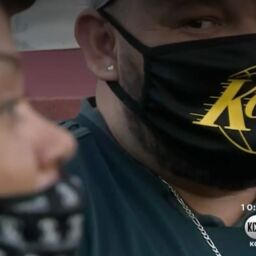A group of Nevada trial lawyers is challenging an Uber-backed proposal to cap attorney fees in civil cases, arguing the effort misleads voters and would make it harder for Nevadans to receive the best legal representation.
In a lawsuit filed Monday in Carson City District Court, the Nevada Justice Association said the ballot initiative to cap attorney fees for plaintiffs at 20 percent of all settlements and awards violates state law by failing to inform voters of its full implications and contended that it’s an effort by Uber to stymie sexual misconduct lawsuits by making it harder for victims to find representation.
A group of sexual assault survivors and their advocates signed onto the suit, and attorneys from across the country also submitted declarations opposing the initiative.
“Uber’s ballot initiative would allow Uber to hire the best and most expensive attorneys, with no limits on its lawyers’ fees, while imposing unprecedented limits on ordinary Nevadans’ ability to obtain legal representation,” the lawsuit reads.
The proposal filed last month by a new PAC called Nevadans for Fair Recovery said capping attorney fees at 20 percent would lead to greater rewards for plaintiffs and lower payouts for “billboard attorneys.” In addition to Uber, the effort is also supported by the Nevada Trucking Association.
The lawsuit argues that the fee cap would make it harder for victims to find lawyers to take on their case — which is not included in the proposal’s “description of effect,” a 200-word explanation of the initiative’s implications including on signature gathering forms — and that many people are unable to afford attorneys who are paid by the hour. Lawyers in these cases typically charge a fee of 33 percent to 40 percent of all rewards to break even, one lawyer said in a declaration.
“Cases of this kind are not easy to litigate,” read a declaration from Jacob Leavitt, a Las Vegas personal injury attorney. “They entail risk, time, and costs. If lawyers cannot break even on these cases, it is much less likely that survivors will be able to find competent counsel.”
Lawyers opposing the proposal — who include the husband of Senate Majority Leader Nicole Cannizzaro (D-Las Vegas) and Alex Velto, a Democratic candidate for state Assembly — also said the proposal hid its true intentions, which they said are to limit representation options for those suing Uber for sexual assault.
There are several active cases in Nevada that allege the ride-sharing company failed to vet its drivers, resulting in passengers being sexually abused. These include a driver who allegedly facilitated the abduction and sexual assault of a 14-year-old girl, another who allegedly drugged his passengers and one who allegedly stalked a passenger for months.
Uber is currently fighting hundreds of allegations that it failed to protect passengers from sexual abuse. Around 250 cases are involved in a “multidistrict litigation” effort in California.
“Uber’s newfound concern for survivors is, in fact, a transparent ploy to prevent people like our clients from finding zealous representation to vindicate their legal rights and hold this multi-billion-dollar corporation accountable,” read a declaration from three attorneys in the California case.
In a statement after the lawsuit was filed, a spokesperson for Nevadans for Fair Recovery said that “lawyers have enjoyed a financial windfall under the current system.”
“It is in their financial interests to prevent this measure from going to the voters,” the statement read. “But we are committed to qualifying and passing this measure, and we will vigorously defend this measure in court so that victims get a fair and just recovery for their injuries.”
Uber did not immediately respond to a request for comment.
In the 2022 election cycle, Citizens for Justice — the political arm of the Nevada Justice Association — was responsible for around a third of the more than $850,000 that the legal community made in campaign contributions to state lawmakers, which mostly went to Democratic legislators.
The proposal is a statutory initiative, so supporters must gather at least 102,362 valid signatures by Nov. 20, with at least 25,591 signatures coming from each of the state’s four congressional districts. If a sufficient number of signatures are gathered, the proposal would go to the 2025 Legislature for approval. If the Legislature does not act on the initiative, the question would be placed on the 2026 general election ballot.
If it becomes law, Nevada would have the strictest attorney fee caps in the country. Two states have blanket caps on attorney fees in civil cases: Oklahoma, whose limit is 50 percent of all rewards; and Michigan, which has imposed a 33 percent cap. In 2021, a 20 percent cap on attorney fees was proposed in California, but it failed to get enough support.
The Nevada Justice Association also commissioned a polling firm to survey Nevadans on the proposal. The poll of 501 Nevadans found that around 62 percent said the description of effect had given them enough information, and 46 percent did not understand that the fee cap would also apply to sexual assault lawsuits.
The proposal is the latest example of the debate surrounding attorney fees. A bill in last year’s legislative session would have removed the cap on attorney fees in medical malpractice lawsuits. The bill stalled in committee, but another bill that became law imposed a blanket 35 percent fee cap in medical malpractice lawsuits. Nevada law previously had different fee caps depending on the recovery amount in those types of lawsuits.
Source: The Nevada Independent April 8 2024
Read the Nevada Contigent Fee Complaint in full.










